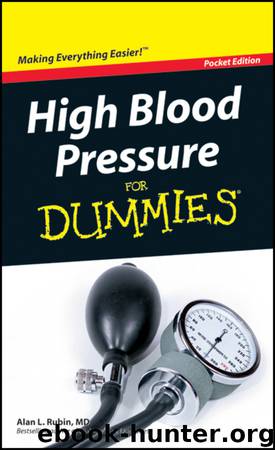High Blood Pressure For Dummies by Alan L. Rubin MD

Author:Alan L. Rubin, MD
Language: eng
Format: epub
Publisher: John Wiley & Sons, Ltd.
Published: 2010-06-16T16:00:00+00:00
Chapter 5
Avoiding Poison: Tobacco, Alcohol, and Caffeine
In This Chapter
Battling bad habits: Contributors to high blood pressure
Quitting tobacco decreases risks
Drowning in alcohol and how it affects your blood pressure
Increasing your blood pressure with caffeine
Nothing you could ever do for your health can make a greater difference than cutting out tobacco, alcohol, and caffeine.
In this chapter, I take up each one of these dangerous habits individually and discuss how they affect your blood pressure. I also discuss how eliminating these poisons from your life can help lower your blood pressure and make your mind and body healthier.
Tobacco, alcohol, and caffeine represent a triple threat to your health. But within that triple threat may also be triple salvation. Reducing or eliminating one of these three poisons often leads to a reduction or elimination of one or both of the others. The tendency to have that cigarette with your scotch or your coffee is eliminated if you don’t drink the scotch or the coffee.
Playing with Fire
When you play with fire, you get burned. When you smoke, you run the risk of getting burned inside and out. Whether tobacco is smoked or chewed or taken in by any other means, the nicotine in the tobacco raises the blood pressure. The more you smoke, the higher the nicotine level is in your blood, and the higher your blood pressure. This accounts to a large extent for the great increase in brain attacks (see Chapter 3), heart attacks and pain in the legs due to poor circulation in smokers, sometimes leading to amputation.
Nicotine raises your blood pressure by constricting your blood vessels. This occurs because the oxygen in your blood decreases and because nicotine directly stimulates the production of a hormone, epinephrine (also known as adrenaline), in the adrenal gland. Epinephrine raises blood pressure. After tobacco use raises blood pressure, you’re at risk of all the medical consequences of high blood pressure (described in Chapter 3), not to mention diseases associated with smoking, such as mouth and lung cancer.
Numerous studies have shown that smoking or chewing tobacco raises blood pressure and that when you stop using tobacco products, your blood pressure falls.
Putting one foot in the grave
Blood pressure elevation is just one of smoking’s many consequences. Other smoking-related complications are as follows.
Lung cancer is 20 times more likely among smokers than nonsmokers.
Cancers of the mouth and throat as well as the bladder are more likely among smokers. The connection isn’t as clear, but smoking is also likely to increase the possibility of cancers of the liver, large intestine, pancreas, kidney, and the cervix in women.
Coronary heart disease is much more common among smokers, whether they have increased blood pressure or not.
Brain attacks (see Chapter 3) are more common among smokers — again, regardless of elevated blood pressure.
Bleeding from rupture of the large blood vessel in the abdomen is more common.
Chronic lung disease is most often the result of smoking.
Lung growth rate is reduced among adolescents who smoke.
Download
This site does not store any files on its server. We only index and link to content provided by other sites. Please contact the content providers to delete copyright contents if any and email us, we'll remove relevant links or contents immediately.
Unwinding Anxiety by Judson Brewer(72976)
The Art of Coaching by Elena Aguilar(53165)
The Fast Metabolism Diet Cookbook by Haylie Pomroy(21126)
Rewire Your Anxious Brain by Catherine M. Pittman(18632)
Healthy Aging For Dummies by Brent Agin & Sharon Perkins RN(17033)
Talking to Strangers by Malcolm Gladwell(13339)
The Art of Thinking Clearly by Rolf Dobelli(10407)
Mindhunter: Inside the FBI's Elite Serial Crime Unit by John E. Douglas & Mark Olshaker(9311)
Crazy Rich Asians by Kevin Kwan(9271)
The Compound Effect by Darren Hardy(8918)
Tools of Titans by Timothy Ferriss(8359)
Periodization Training for Sports by Tudor Bompa(8247)
Becoming Supernatural by Dr. Joe Dispenza(8194)
Wonder by R. J. Palacio(8095)
Crystal Healing for Women by Mariah K. Lyons(7919)
Bodyweight Strength Training by Jay Cardiello(7902)
Change Your Questions, Change Your Life by Marilee Adams(7732)
Therapeutic Modalities for Musculoskeletal Injuries, 4E by Craig R. Denegar & Ethan Saliba & Susan Saliba(7710)
Nudge - Improving Decisions about Health, Wealth, and Happiness by Thaler Sunstein(7689)
